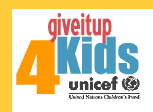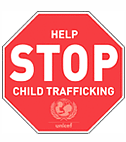 |
 |
|||||
 |
||||||
 |
||||
 |
||||
 |
||||
|
NEWS Children are not for sale – $1 a day can make a BIG difference By Farah Kurji, SNN Editor, UNICEF BC Youth Representative, Hugh Boyd Secondary, Richmond, BC  "One day, a man, I have even forgotten his name, came to pick me up at night after he had talked to my godmother. That same night, I travelled with him and nine other children that I didn't know. There were people waiting for us. They gave me to one of them and he took me to a place at Tiko, where I worked as a domestic [servant]. I only received one meal a day. Whenever I made a mistake, I was badly beaten. If they need me while I was asleep, and if I did not react immediately, it was the whip that made me get up from my mat. Tired of the work and the bad treatment I experienced everyday, I escaped," said a Cambodian child.  Statistics indicate that over one million children are sold and exploited all over the world. They are to be used as domestic labour in farming, fisheries or in the sex trade. It seemed only appropriate to stop child trafficking by making it this year's theme for UNICEF's 2002 "giveitup4kids" campaign. The goal of this years campaign is to raise awareness as well as money for children all over the world who are in danger of being trafficked. UNICEF is concerned with the plight of children and is committed with the help of teenagers across Canada to raise money for the fair treatment of all children. Presently UNICEF is working to end this cruel treatment among children through education and working with governments to outlaw human trafficking. In Asia and Europe girls as young as 13 are exported all over the world as "mail-order brides." In Guatemala, 1,500 babies are trafficked to North American and Europe for adoption. Shockingly, child trafficking is even a problem in Canada. Children from the United States, Mexico, Europe and Asia are sold as sex workers, brides and drug dealers in cities like Toronto, Montreal and Vancouver. The goal of this year's campaign is to raise $40,000 in British Columbia. The average high school student buys a can of pop daily without even thinking. That money however could be of immense importance to someone overseas in a dangerous trafficking situation. Just by giving up one can of pop twelve kids in a developing country can be vaccinated against measles. If that's what $1 can do, imagine what giving up a CD or video game can do. The "giveitup4kids" campaign shows students in Canada how as little as a dollar can make a difference. Every teenager out there has the power to make a profound difference in the life of one child. By getting involved or starting a "giveitup4kids" campaign in your school you, can help stop this inhumane behaviour overseas. Log on to giveitup4kids.ca to learn more about what you can do to help. |